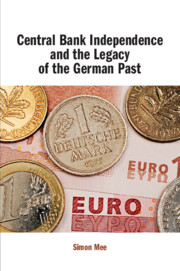Refine search
Actions for selected content:
13 results
4 - The Stability Imperative (1965–1966)
-
- Book:
- Trading Power
- Published online:
- 14 October 2022
- Print publication:
- 03 November 2022, pp 98-130
-
- Chapter
- Export citation
7 - A Decisive Election (1969)
-
- Book:
- Trading Power
- Published online:
- 14 October 2022
- Print publication:
- 03 November 2022, pp 198-230
-
- Chapter
- Export citation
6 - The Magnetism of Prosperity (1967–1968)
-
- Book:
- Trading Power
- Published online:
- 14 October 2022
- Print publication:
- 03 November 2022, pp 165-197
-
- Chapter
- Export citation
Conclusion
-
- Book:
- An Exchange Rate History of the United Kingdom
- Published online:
- 23 September 2022
- Print publication:
- 29 September 2022, pp 224-226
-
- Chapter
-
- You have access
- Open access
- HTML
- Export citation
14 - Britain’s Last Currency Crisis
-
- Book:
- An Exchange Rate History of the United Kingdom
- Published online:
- 23 September 2022
- Print publication:
- 29 September 2022, pp 204-223
-
- Chapter
-
- You have access
- Open access
- HTML
- Export citation
6 - Contractual Change and Central Bank Action
- from Part III - The New Stability Conception
-
- Book:
- The Currency of Solidarity
- Published online:
- 24 September 2020
- Print publication:
- 08 October 2020, pp 261-289
-
- Chapter
- Export citation
7 - Reconciling the Contract with the Treaties
- from Part III - The New Stability Conception
-
- Book:
- The Currency of Solidarity
- Published online:
- 24 September 2020
- Print publication:
- 08 October 2020, pp 290-349
-
- Chapter
- Export citation

Central Bank Independence and the Legacy of the German Past
-
- Published online:
- 13 September 2019
- Print publication:
- 12 September 2019
2 - The Bank deutscher Länder and the Foundation of West Germany, 1948–1951
-
- Book:
- Central Bank Independence and the Legacy of the German Past
- Published online:
- 13 September 2019
- Print publication:
- 12 September 2019, pp 90-148
-
- Chapter
- Export citation
4 - The Shadow of National Socialism: Karl Blessing and the Bundesbank in 1965
-
- Book:
- Central Bank Independence and the Legacy of the German Past
- Published online:
- 13 September 2019
- Print publication:
- 12 September 2019, pp 192-251
-
- Chapter
- Export citation
5 - The Bundesbank, Social Democracy and the Era of the ‘Great Inflation’, 1970–1978
-
- Book:
- Central Bank Independence and the Legacy of the German Past
- Published online:
- 13 September 2019
- Print publication:
- 12 September 2019, pp 252-313
-
- Chapter
- Export citation
3 - Adenauer’s Challenge: The ‘Gürzenich Affair’ and the Bank deutscher Länder, 1956–1957
-
- Book:
- Central Bank Independence and the Legacy of the German Past
- Published online:
- 13 September 2019
- Print publication:
- 12 September 2019, pp 149-191
-
- Chapter
- Export citation
Introduction
-
- Book:
- Central Bank Independence and the Legacy of the German Past
- Published online:
- 13 September 2019
- Print publication:
- 12 September 2019, pp 1-32
-
- Chapter
-
- You have access
- HTML
- Export citation
